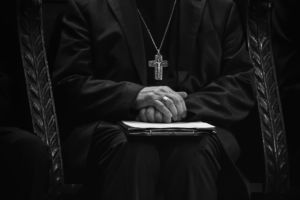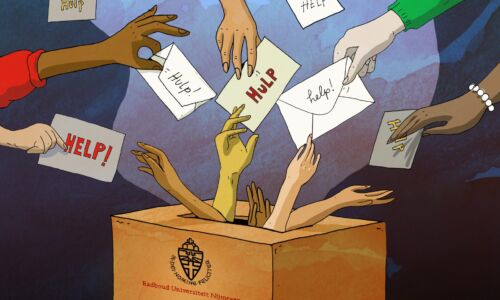How religion fades away from the Campus
Radboud University professors are more likely to be atheist or agnostic than religious, and the vast majority neither pray nor attend church services on a regular basis. Still, opinions are strongly divided on the traditional prayer, although the majority believe it shouldn’t be a requirement for a PhD defence. These are the results of a VOX survey about religion on Campus.
This autumn, Statistics Netherlands (CBS) reported that for the first time in history, the majority of Dutch citizens are non-religious. But how do things stand at Radboud University? And if the majority are non-religious, should the University continue to protect its religious identity? VOX sent all Nijmegen professors – more than five hundred in total – a survey with questions about their religious beliefs and Radboud University’s Catholic persuasion. Approximately half of them responded.
The figures show that religion plays a minimal role in the lives of the Campus inhabitants surveyed. The majority of the professors surveyed view themselves as non-religious: more than 40% claim to be atheist and a small 20% agnostic. Of the religious professors (one quarter), one third is strongly religious, while the rest see themselves as ‘slightly religious’.
Meanwhile, the University continues to promote itself as a Catholic institution. For as long as we can remember, all academic ceremonies at Radboud University have begun and ended with a short prayer. Even though only initiates and classicists know what is being said, as the text is in Latin: ‘Spiritus Sancti gratia illuminet sensus et corda nostra’ – in English: ‘May the Holy Spirit illuminate our minds and hearts’. Ceremonies are concluded with a closing prayer: ‘Almighty God, we thank You for all Your blessings. You who lives and reigns forever and ever.’
Signature
Not that long ago, Folia columnist Linda Duits, in Nijmegen to take a seat in a graduation committee, reacted indignantly: ‘In a university environment, God should be entirely optional,’ she argued. The Nijmegen Executive Board disagrees. In a column on the University website, President of the Executive Board Daniël Wigboldus praised the binding power of joining in prayer.
And yet the traditional prayer is not popular. A small majority of the professors surveyed agree with Linda Duits: it should be possible to defend one’s PhD at Radboud University without prayers.
Where the opinions of the surveyed professors diverge concerning the prayer, there is clear consensus concerning the University’s Catholic persuasion. Should Radboud University place greater emphasis on its identity as a Catholic University? ‘No’, say 80% of the respondents. Religion should not play a role at all, say Professor of Psychology Toni and Professor of Medicine Maas, except perhaps within a theological faculty. Legal expert Schutgens notes that the Catholic faith is not particularly prominent on Campus. ‘It’s mainly present in symbolic form, as a consideration for others or care for the living environment. And what sane person could object to this?’
Bishops’ Conference
Nevertheless, vacancies for membership of the Radboud University Executive Board and the Stichting Katholieke Universiteit mention that ‘preference will be given to candidates of Catholic persuasion.’ This is in line with the statutes of the Stichting, which stipulate that the Stichting Board is responsible for ‘protecting and promoting’ the Catholic identity of the University and hospital. Also, formally, the responsibility for appointing members of the Board of the Stichting (on the recommendation of the SKU) falls to the Bishops’ Conference of the Netherlands – as representatives of Rome.
Recently, the Foundation board, after questions by student faction AKKUraatd, did hint at its wish for more room to appoint non-catholic candidates. The directors think that strictly holding on to the Catholic requirement ‘limits the possibility to get qualitatively good people’, said Foundation board director Peter Holland during the General Meeting of the university. ‘We will have to experience the margins for that as we go along’, he did add.
Is there no Bishop on the Board then?
 Is the Bishop of ’s-Hertogenbosch a member of the Board of the Stichting Katholieke Universiteit (SKU)? And does he have a voice in the appointment of Executive Board members? The majority of the professors surveyed are unsure about the answers to these questions. Here is how it works:
Is the Bishop of ’s-Hertogenbosch a member of the Board of the Stichting Katholieke Universiteit (SKU)? And does he have a voice in the appointment of Executive Board members? The majority of the professors surveyed are unsure about the answers to these questions. Here is how it works:
The Board of the Stichting Katholieke Universiteit (SKU) is responsible for supervising the Executive Board of Radboud University and the Executive Board of Radboud university medical center. The members of the Board of the SKU are appointed by the Bishops’ Conference of the Netherlands, on the recommendation of the SKU Board itself. At present, the Board of the SKU consists of five members and is chaired by former politician Loek Hermans. There are no Bishops on the board.
The SKU appoints the members of the Executive Board. The Bishops have nothing to say about these appointments. Professors are appointed by the Executive Board on the recommendation of the Dean of the Faculty. In addition, all lecturers of the Theology department – including professors – also need a ‘mandatum docendi’ (teaching mandate) from the Bishop. But the theologians don’t have to be Catholic.



